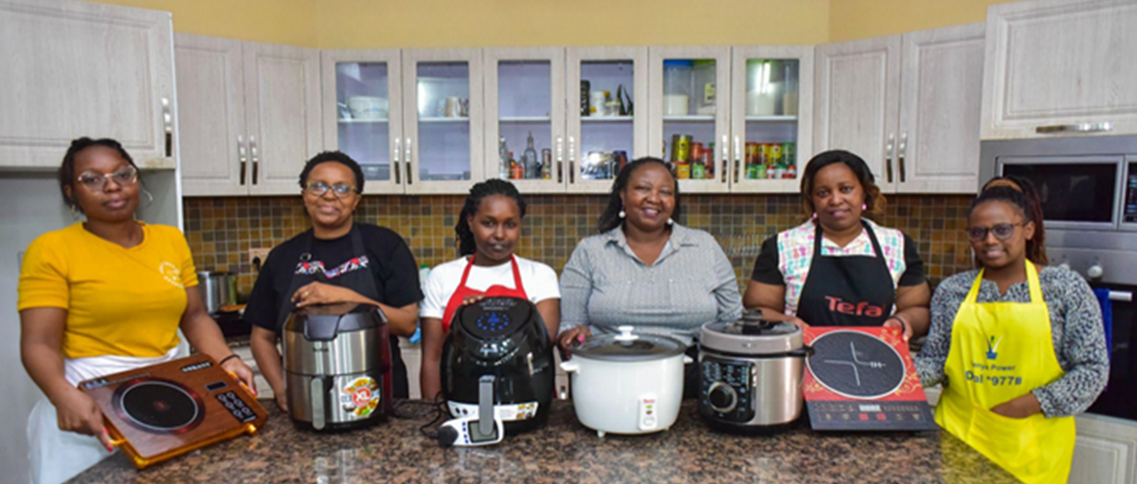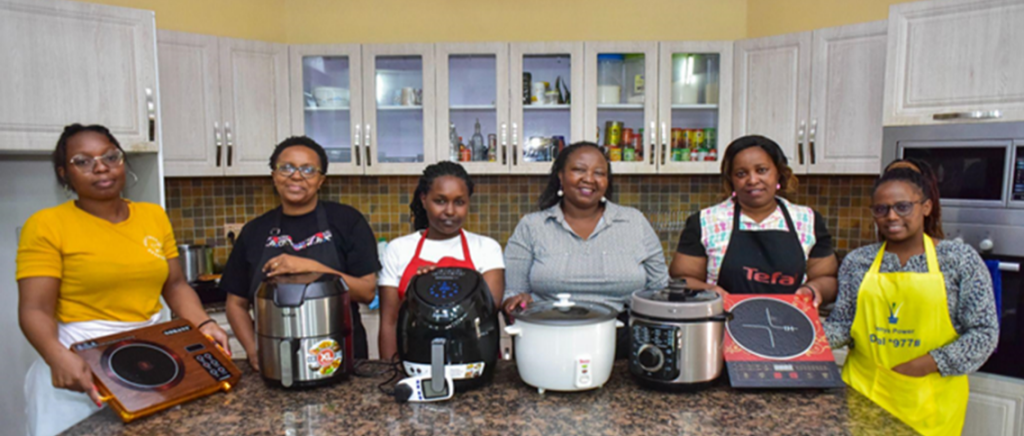
- Date
- 24th January 2024
- Categories
- Electrification, Gender, Social Inclusion
By Syprose Ochieng, Jon Leary, Beryl Onjala, Yesmeen Khalifa, Jane Spencer, and Ed Brown.
In this blog, we aim to highlight the importance of Gender Equality and Social Inclusion (GESI) and reflect upon how it has been integrated into the strategy development, capacity building, and market development that has taken place under the UK PACT (Partnerships for Accelerating Climate Transitions) funded project Accelerating the Electrification of Cooking in Kenya, which was implemented by Modern Energy Cooking Services Programme (MECS) and its partners in Kenya.
Overview of project
As a response to the Kenyan Government’s request to the Energy Transitions Council’s Rapid Response Facility, the MECS, and UK PACT programmes joined forces with a coalition of development partners to support the Ministry of Energy & Petroleum (MoEP) to create Kenya’s Cooking Transition Strategy (KCTS) and National eCooking Strategy (KNeCS). EED Advisory was contracted to develop the KCTS and Nuvoni Centre for Innovation Research to develop the KNeCS, which was supported by a capacity building and market development programme for eCooking (eCAP) implemented in partnership with Kenya Power.
Importance of GESI
Kenya’s Cooking Transition Strategy and eCooking Strategy are crucial for sustainable development, addressing key national development priorities such as public health and climate change. However, the challenges of traditional cooking methods are often disproportionately affecting women and marginalized communities. Gender Equality and Social Inclusion (GESI) must be mainstreamed throughout the strategies to address these differences and ensure women’s effective participation in the eCooking transition and contribution to decision-making.
The Kenyan government’s strategy development aligns with international development goals and human rights principles, emphasizing equal opportunities, non-discrimination, and social justice. The Ministry of Energy and Petroleum’s (MoEP’s) Gender Policy demonstrates its commitment to enhancing equal opportunities for all. This forms a key part of the Kenyan government’s strategic objective of mainstreaming gender in public institutions, policies, and programs to advance gender equality and women’s empowerment as per the Constitution and SDG 5.
Entry points for GESI during the strategy development
a) Inclusive Gender Representation in Strategic Decision-Making
The MECS team and partners have prioritized gender inclusivity in the strategy development, by ensuring representation of both genders at every step of the decision-making, in line with the Gender Policy’s one-third rule. Key stakeholders of all genders are actively engaged in the review process, ensuring diverse perspectives are heard. The broader committee membership comprises 98 stakeholders from various sectors, including non-governmental organizations, community-based organizations, civil society, think tanks, government ministries, the private sector, and international development organizations. Although constantly evolving, the membership currently has 38 women and 60 men, reflecting the commitment to gender equity by fulfilling the one-third gender rule and ensuring that the strategies resonate with diverse needs and concerns, enhancing credibility and legitimacy.
To ensure diverse perspectives were embedded within strategies from the very beginning, the MECS and MoEP teams ensured that the strategy development teams themselves were gender-balanced as a key element of the tendering process. For example, the Kenya Cooking Transition Strategy is led by a male consultant accompanied by both female and male colleagues, while the eCooking Strategy is led by a female consultant, supported by both male and female team members.
b) Mainstreaming GESI into the Strategies
Additionally, both strategies have emphasized GESI, with the eCooking Strategy emphasizing the role of women entrepreneurs and leaders in the value chain. It specifically highlighted the need for the Results-Based Financing (RBF) component to be more gender-inclusive by incorporating additional financial incentives for enterprises that effectively include women in the value chain, either through employment or women-led distributorships. Strategies are explored to empower women entrepreneurs and scale adoption within their areas of influence, recognizing their pivotal role in fostering adoption across various socio-economic backgrounds.
The Cooking Transition Strategy emphasizes the government’s role in ensuring last-mile cooking access for everyone. The program uses public institutions as anchor points for clean fuels and a hub-and-spoke model to extend to neighbouring households. Incentives are provided to stove and appliance distributors to expand networks and reduce upfront costs, ensuring all members, including marginalized groups, have access to clean cooking solutions, repairs and maintenance services, and training sessions.
c) Mainstreaming GESI into Data Collection Tools
Our implementation partners have ensured GESI is integrated into data collection by considering energy access, usage patterns, and the socio-economic impact of clean cooking technologies on women and marginalized communities. For example, the eCooking Strategy Baseline Study revealed that male-headed households which constitute 51.1 percent of the 350 households sampled had more access to Tier 3+ Solar Home Systems. eCooking is expected to make higher-capacity solar home systems more attractive to female-headed households (48.9%) but to realize potential, social inclusion and gender-responsive business models are needed. This can include subsidized pricing, affordable financing options, and partnerships with financial institutions.

d- Mainstreaming GESI during the Implementation of the eCAP Programme
The eCooking Capacity Building & Market Development Programme (eCAP) was implemented by Kenya Power in partnership with MECS to expedite the electrification of cooking by developing market-ready innovations and enhancing capacity within Kenya Power. The programme strategically provided an enabling environment for womens’ leadership in the eCooking sector with many female-led teams including Jane Spencer (MECS), Irene Wanjohi and Wairimu Njehia (KPLC); Elsie Onsongo (Nuvoni); Sandra Banda (Strathmore); Agnes Kalyonge (Jikoni Magic); Mercy Kamau (SCODE); and Philomena Mitalo (CCAK). Below, we present several of the twelve projects which were particularly successful in integrating GESI.
The Pika na Power Academy, a weeklong residential course by Kenya Power’s Institute for Energy Studies and Research, aimed to unite individuals from diverse backgrounds through a comprehensive curriculum covering topics such as consumer financing, business models, testing methods, e-recipes, e-cookbooks, appliance categories, energy fundamentals, energy-saving techniques, international supplier negotiation, importation procedures, after-sales service, repair/maintenance, household wiring assessments, marketing strategies, and kitchen energy audits. The trainees comprised of 11 women and 9 men.
This program empowered last-mile entrepreneurs in Kenya to bring eCooking solutions to underserved areas, enabling them to compete with larger players and foster inclusivity. Through collaboration with PowerPay Africa, entrepreneurs and their newly formed Electric Cooking Entrepreneurs Association of Kenya (ELCEAK) are digitizing their appliances, facilitating sales on the PAYGO model. This financing mechanism enhances accessibility and affordability for women and marginalized communities, making it easier for distributors to monitor and track devices sold on PAYGO, and for users to measure energy consumption and carbon emission reduction in real-time.

The Accelerating eCooking in Urban Informal Settlements study aimed to ensure social inclusion in eCooking adoption by examining current cooking practices, energy usage, and the factors influencing energy choices in informal settlements. A household survey was carried out with over 350 families, where female-headed households represent 48.9 percent of the total, and male-headed households constitute 51.1 percent, demonstrating the desire to embrace eCooking, particularly Electric Pressure Cookers (EPCs), driven by their speed, cost savings, and convenience due to their self-regulating features. However, women-dominated food vending businesses encountered challenges due to the typical EPC’s limited capacity and the necessity for multiple concurrent cooking points. Consequently, the study recommended addressing EPC design to accommodate the demands of food vending businesses in informal settings.
In 2022, the Clean Cooking Association of Kenya (CCAK), Kenya Power, and Africa Centre for Technology Studies and MECS have collaboratively established eCooking Hubs across four counties: Kitui, Makueni, Kisumu, and Nakuru. Under the Intersectoral Dialogue eCAP project, a fifth eCooking Hub was launched in Kakamega at the Lugari Youth Empowerment Centre in 2023. Plans are underway to launch two additional hubs in Homabay and Tana River in 2024. These initiatives aim to promote eCooking, particularly targeting women and marginalized groups. In particular, the Kakamega and Kitui hubs are leading efforts to ensure social inclusion, with a focus on the contributions of champions with disabilities, emphasized by Mr Danson Ligare.



The Appliance Comparisons project was implemented by a team of skilled female engineers from Strathmore University, who had recently completed internships supported by the Power Africa initiative designed to open up employment opportunities for promising graduates in fields traditionally dominated by men.

Above photo shows the members of Strathmore University’s female engineering team based at the UNESCO Chair for Climate Change Resilience and Sustainability, alongside the Kenya Power, Rashu Enterprises, and Kisambara Ventures teams who collaboratively carried out the Controlled Cooking Tests (CCTs) for the Appliance Comparisons eCAP project.
Lastly, is the Digital Engagement project which involved a diverse group of participants, including upcoming female food bloggers and content creators. In particular, the Pika Ushinde (Cook to Win) competition, which not only ignited their creativity but also provided a platform to boost their visibility, influence, and leadership in the digital world.

Conclusion
Together with our partners, we have consciously sought to transcend the conventional ways of project implementation to create a strategy that is not only forward-looking but inherently socially inclusive by embedding GESI principles throughout the process. From the conceptualization during the tendering process, to stakeholder engagement and implementation of the various elements of this complex project, we have endeavoured to ensure that decision-making, data collection/analysis, and the final strategies themselves fully align with GESI principles.
Moving forward, the focus on GESI during this programme of activities has opened up many new entry points for more inclusive activities. For example, the scoping study carried out in the eCooking in Informal Settlements project has paved the way for a future market development programme targeting the urban poor. The positive experiences with the Kakamega Hub have shown the value of including the youth and People Living with Disability (PWDs). Meanwhile, ELCEAK offers last-mile distributors a platform to collaborate and bring eCooking to marginalized groups across the country that otherwise would be overlooked by the major appliance distribution companies. The involvement of such a diverse set of stakeholders in this process has facilitated the development of National Strategies that will enable the eCooking and Clean Cooking sectors respectively to grow inclusively, creating new opportunities for women and marginalized groups throughout their development, implementation and beyond.
Featured Image: Members of Strathmore University, Kenya Power, Rashu Enterprises, and Kisambara Ventures. Photo Credit Okova Kagia (KPLC).